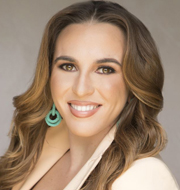Supporting Deaf and Hard of Hearing Students
By Rebecca Edelman, Ph.D. | March 2023
 Standing in the hallway as a school day is starting, you can hear the bustling of students, friends talking, lockers closing, teachers calling out and someone probably shouting in the distance; it’s almost melodic and musical. The school is alive; you can hear it. But what if you couldn’t? What if you stood there, saw all of this happening and could not hear it? Could not hear the melody of a school alive? Hear a friend calling your name? This is the reality for students who are Deaf and hard of hearing in schools today.
Standing in the hallway as a school day is starting, you can hear the bustling of students, friends talking, lockers closing, teachers calling out and someone probably shouting in the distance; it’s almost melodic and musical. The school is alive; you can hear it. But what if you couldn’t? What if you stood there, saw all of this happening and could not hear it? Could not hear the melody of a school alive? Hear a friend calling your name? This is the reality for students who are Deaf and hard of hearing in schools today.My research and experiences have found that children who are Deaf or hard of hearing are not provided equitable social/emotional development opportunities within peer groups. These students have unique needs and we, as school counselors, have an important role in addressing those needs and providing equitable spaces to empower their voices by ensuring that they, like all of our students, have access to social/emotional developmental resources and career resources that foster their desires, and can access the academic curriculum in a way that is meaningful for them.
School counselors can support Deaf and hard of hearing students in unique and specific ways to help meet their needs and to foster self-empowerment. From my own research, I have found that students who are Deaf and hard of hearing have not always been seen or given a voice in their school or academic decisions. Through conducting a narrative inquiry, I found that school counselors can support Deaf and hard of hearing students in three key ways.
The first is by aiding in providing access. Although it is not expected for school counselors to learn a whole new language, they can aid in creating access by advocating for resources and opportunities through mentorship with other Deaf or hard of hearing individuals. School counselor can also advocate for access to classroom spaces. Often, students who are Deaf or hard of hearing are taken out of the traditional classroom. From my research, Deaf and hard of hearing students often were frustrated with this experience and felt they were only receiving remedial interventions solely because they couldn’t hear the same way as their classmates. Supporting peer connections and friendships is another way for school counselors can support access, by impacting the overall school climate in ways that can foster spaces for Deaf or hard of hearing students. Most important, we have the power to connect students with access to needed mental health resources.
The second key way school counselors can support Deaf and hard of hearing students is through fostering opportunities for personal identity development. This focuses on the student’s cultural identity woven into their view of self and their Deaf identity fostered by exploration of the Deaf community. There is a vast span of mentorship opportunities to allow students to explore their full identities and access communities that represent who they are.
Third, school counselors can support Deaf and hard of hearing students by providing opportunities for advocacy and supports within the school and for families. Providing access to resources, meetings for services, and asking the student what they need and want is an impactful way school counselors can advocate for students to provide access and support.
Although there are many large actions school counselors can take to support students, the little things often make the biggest difference in the everyday life of a student. Our biggest role is asking the right questions, providing support and ensuring a voice at the table for each student.
Rebecca Edelman, Ph.D., is an assistant professor at Husson University, edelmanr@husson.edu. Please contact the author for complete references.